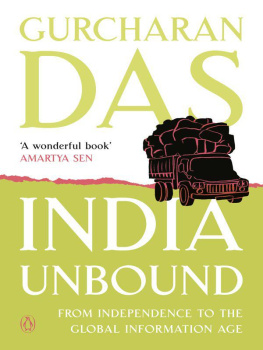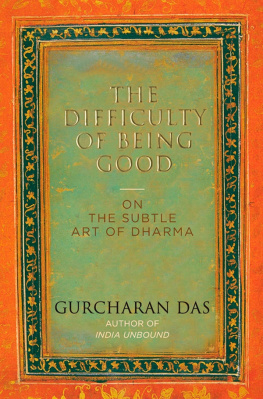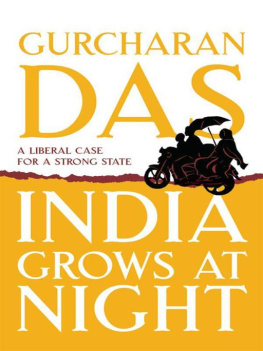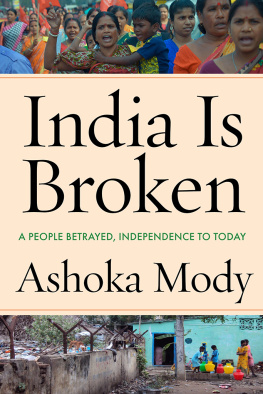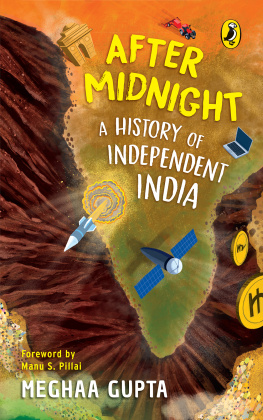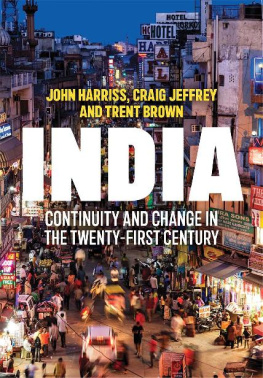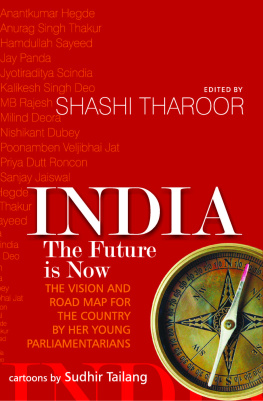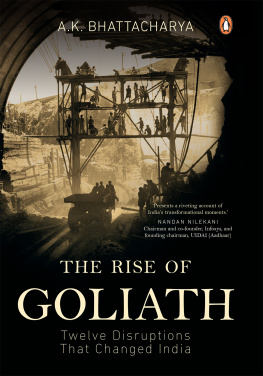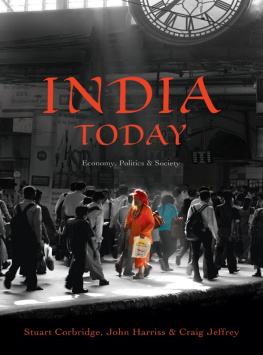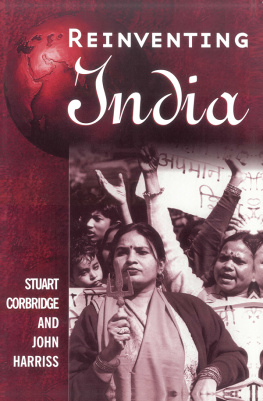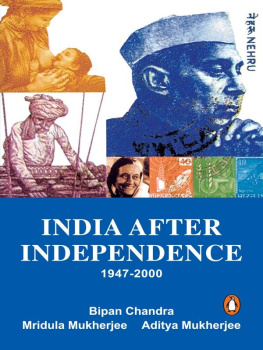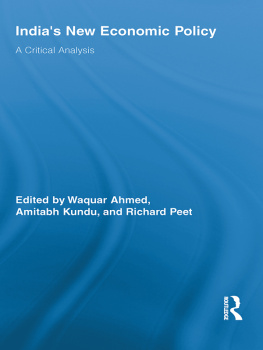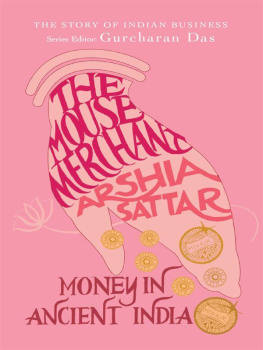
GURCHARAN DAS
India Unbound
From Independence to the Global Information Age

PENGUIN BOOKS
Contents
PENGUIN BOOKS
INDIA UNBOUND
Gurcharan Das is an author and public intellectual. He writes a regular column for the Times of India, Dainik Bhaskar, Eenadu and other newspapers. He also writes for the Wall Street Journal, Financial Times, Newsweek and Foreign Affairs. He graduated from Harvard University in philosophy and politics and was CEO of Procter & Gamble India before he took early retirement to become a full-time writer.
He is the author of the novel A Fine Family. His other literary works include a book of essays, The Elephant Paradigm, and an anthology, Three English Plays, consisting of Larins Sahib, a prize-winning play about the British in India, which was presented at the Edinburgh Festival; Mira, which was produced off-Broadway to critical acclaim; and 9 Jakhoo Hill, which has been performed in major Indian cities.
First published in 2000, the best-selling India Unbound has been translated into several languages worldwide, and was also made into a film by the BBC.
Praise for the Book
It is a wonderful booka great mixture of memoir, economic analysis, social investigation, political scrutiny and managerial outlook being thrown into the understanding of India The temper of the book is both critical as well as optimistic, and I think the combination works well. Gurcharan being happier with the world makes a differencethere is a kind of positiveness that breathes through every pageAmartya Sen
This brilliant work in political economy is for all young Indians, especially budding politicians and IAS probationers. It deserves to be translated in all Indian languages so that the common person can become better educated about the policies that they want for their countryN.R. Narayana Murthy
Having constructed a comprehensive indictment of Indias economic failures, Das is optimistic about the liberalization that has opened the economy in the 1990s Das writes in an engaging style, sprinkling his text with a well-chosen array of quotations. There are layman-friendly discussions of economic theories of poverty, and his arguments are leavened with a close reading of economic texts, both classic and contemporary. But what shines through is the telling anecdote, the personal example, the remembered conversationShashi Tharoor, Los Angeles Times
Theres much to be said for this book. In the first place, its interesting, for Das is a natural storyteller. Second, its unpretentiousthe language, while adequate, is without unnecessary flourishes. Third, its informativeit contains a mixture of history and autobiographywhich includes some essentials for anyone in business or managementand the reader glides smoothly from one to the otherShashi Warrier, Indian Review of Books
Gurcharan Das is by any standard an amazing man India Unbound is an education by itself. [He] goes back and forth into history, politics, social changes as and when the situation calls for, and speaks more about the world around him than about himself Even when he is critical of Jawaharlal Nehrus policies he is appreciative of his sentimentsM.V. Kamath, The Daily Sunday
Gurcharan Das has written a paean to liberalization ( India Unbound )arguably the most readable book on the reforms of the 1990s. Gurcharan is a magical writer and a great storyteller; his account of the reforms is so upbeat that even I thought we had accomplished somethingAshok Desai, Business Standard
India Unbound is bound to become an essential component of the reading list for anyone interested in the contemporary Indian economySushma Ramachandran, The Hindu
Gurcharan Das is a good storyteller. He weaves a series of unconnected actions into a pattern with some sort of theme. His technique is to put himself, often vicariously, as an observer, occasionally a participant, into the events he describes; in this way he gives immediacy to historySudhir Mulji, Business Standard
Why has a country as bountifully blessed as India achieved so little in a half century of freedom? Gurcharan Das provides a fascinating interpretation of the possible reasons in India Unbound Not often does one come across a former CEO of a major organization who is also well-read in a wide range of subjects, ranging from economics to philosophy to poetry. And if one does come across them on rare occasions, not many can wield a pen as dexterously as Das doesV.S. Mahesh, Business India
Gurcharan Dass keen eye captures the panorama of the last 50 years of Indian history in his own way both fascinating and interesting India Unbound keeps your interest in top gear throughout the bookShunu Sen, Business Line
The change in India since economic liberalization in 1991 has been astonishing, and the pace of it picks up every day. On a recent visitafter several yearsI found a book which gave a vivid and persuasive explanation of the transformation all around me. India Unbound is a mixture of memoir and social and economic inquiry, written with great energy, personal knowledge and clarity. I would firmly recommend it to any visitor to India as a key guide to its recent pastIan Jack, New Statesman
India Unbound is at the top of the countrys best-seller list for non-fiction, tapping into a vein of renewed self-confidence and national pride that is itself a central theme of his study. Part memoir, part history, part travelogue, part polemic, India Unbound dissects the failures of the countrys Nehruvian socialist experiment and vividly describes the changes that are transforming the daily lives and outlooks of the countrys 1 bn peopleJohn Thornhill, Financial Times
India Unbound is a lively, interesting and well-documented answerthe first of its kindto a key question: why was India rich, why is it poor, when will it be rich again? It is also full of the kind of stories which make that fascinating country come alive for the readerOlivier Bernier, author of The World in 1800
India Unbound is a quiet earthquake that shook faraway shores long before its shockwave reached Britain. [Its] conclusion is that in the next two decades India will become the third-largest economy, after the US and China [and] two industries, information technology and agriculture, will lift India out of poverty. It talks of an India where teenage tea-shop assistants work to save money for computer lessons [and] says that if the poor get rich and a few people get filthy rich, that is better than worrying about the distribution of wealth and no one getting rich. Amartya Sen, the Nobel Prize-winner, was so impressed he asked Das to start a secular, right-wing party modelled on Britains Tories in India The Guardian
Part memoir, part journalism, part history and part management bible India Unbound is an opinionated but insightful guide to a rapidly changing nation in which old cliches about spirituality and poverty are increasingly irrelevant Das had a ringside seat at the events he describes, and the result is an engaging account that moves easily from the big picture to the telling anecdote New York Times Book Review
The strength of [Dass] inquiry lies in its castigation of those who inherited the running of India from the British. He is commendably scathing about Nehru and his daughter Indira Gandhi, who had her fathers hubris and contempt for businessmen but not a trace of his erudition The author regards economic growth as the only way to strengthen Indian democracy [and] his optimism is potent when he says, We have good reasons to expect that the lives of the majority of Indians in the 21st century will be freer and more prosperous than their parents. Never before in recorded history have so many people been in a position to rise so quickly. The Wall Street Journal
Next page
